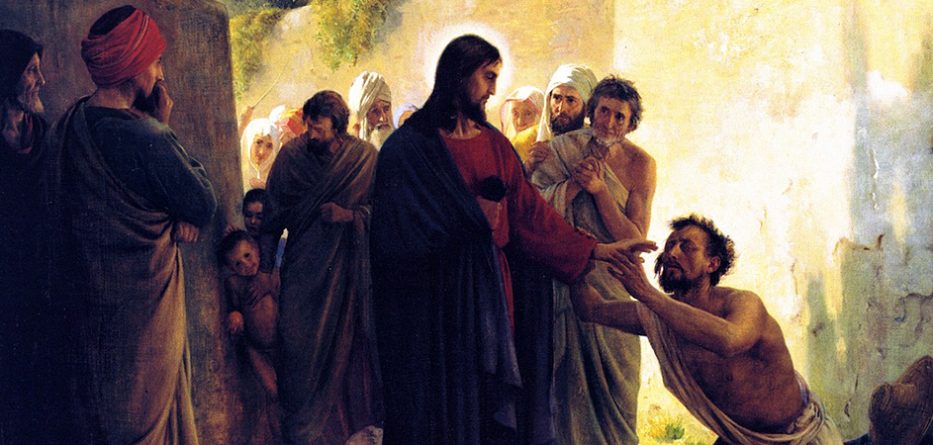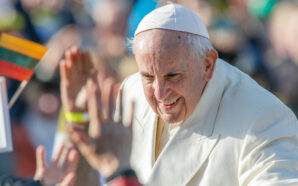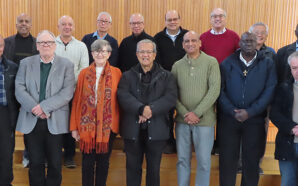Do you remember the story of the blind beggar, Bartimaeus? (Mk 10:46-52)
Bartimaeus is desperate to get to the feet of Jesus. He shouts out: ‘Jesus, Son of David, have mercy on me!’ He is rebuked and told to be quiet. But he shouts all the more. Jesus stops and asks him what he wants.
Throwing off his cloak, he springs up and comes to Jesus. He says that he wants to see. Jesus says to him: ‘your faith has healed you.’ Immediately, he receives his sight and follows Jesus along the road.
At the time of Jesus, a cloak represented security for a blind man. Blind people were considered to be cursed by God. Their only protection against the elements was their cloak. The blind man dropped his cloak. In doing so, he dropped all the security he had ever known to follow the one named Jesus.
I wonder what our ‘security blankets’ are as Catholics today? I suppose it will vary for each of us. But certainly our ‘security blankets’ bring us a sense of the familiar and some sense of assurance that we can protect ourselves.
Why do we have ‘security blankets’? Part of the reason is that we find it hard to admit and face our hidden fears. I know when I think of my own ‘security blanket’, I have to acknowledge there is something inside me that is afraid that I will not be understood. I especially begin to have these feelings when I am threatened or misunderstood. There are moments when I reach for my ‘security blanket’ to provide protection from what I consider to be cruel world that does not seem to understand. This is the response of someone who has not let go and accepted that they need to be ‘saved’.
And if we are all to deeply accept that Jesus came, as the Creed proclaims, ‘for our salvation’, we must experience this urgent need for liberation. A basic truth of the Gospel is that if one does not feel in desperate need of salvation, it is impossible to receive that gift from Jesus. If everything is fine and comfortable for us, then Jesus has no way of reaching us.
It is quite good for us and normal to be in a mess. Perfect people need not apply for membership in the Body of Christ. As Dorothy Day once exclaimed: ‘Jesus came to comfort the disturbed and disturb the comfortable.’
What an example Bartimaeus can be to us in that regard. He wants to see. He is willing to risk his only security to have the opportunity to come before Jesus. First, he had to have faith that it was going to be OK to leave his security. Second, he wanted very badly to receive his sight. Even when he was told to be quiet, he kept on calling out to Jesus. Third, his cry was for mercy. He had nothing to offer Jesus. He was totally dependent on Jesus to help him.
Like Bartimaeus, we too have to set aside our ‘security blankets’, whatever they may be. They prevent us from coming to Jesus. We, like Bartimaeus, have to be somewhat ‘desperate’ as we follow Jesus in our culture, which so avoids discomfort and insecurity. If we can gather the courage to do so, then our prayer becomes like that of Bartimaeus—heartfelt. It is short and to the point.
We cannot move towards Jesus until we believe that he will take care of us. We have to get up, throw off the blanket that we hide behind, cry out in desperation, and come to Jesus. He will receive us. We will never be denied when we come in such simple, heartfelt faith. For that is why he came—for our salvation.
Bartimaeus cries out and Jesus asks:
‘What do you want me to do for you?’
Isn’t it obvious!
Can’t you see!
Dare you look in my eyes
and see what I cannot?
I know I am blind.
I have never seen the dawning day,
nor the trees swaying in the breeze,
birds soaring in the sky
or even the pity in my own parents’ eyes.
My need is great.
I need you.
I will not sit silent by the roadside
hearing your footsteps pass by.
I will call out to you,
even though they muffle my cries
and demand I become dumb also.
But I will not cease calling,
crying out your name.
I need you.
And then you ask,
What do you want me to do for you?
I want to see.
Not just my own hands, or those who
sneer at me.
Not just the bread I eat or the flowers
on the wayside.
It is your face I want to see.
I need to see the love that is possible,
the compassion that is tangible.
I know I am blind.
I want to see—and then no choice
will I have
but to follow.
– Anonymous Ignatian meditation
This article is part of a series of reflections entitled ‘I Believe…Help My Unbelief’: Meditations on the Creed by Br Mark O’Connor FMS.
Br Mark O’Connor FMS is the Vicar for Communications in the Diocese of Parramatta.








